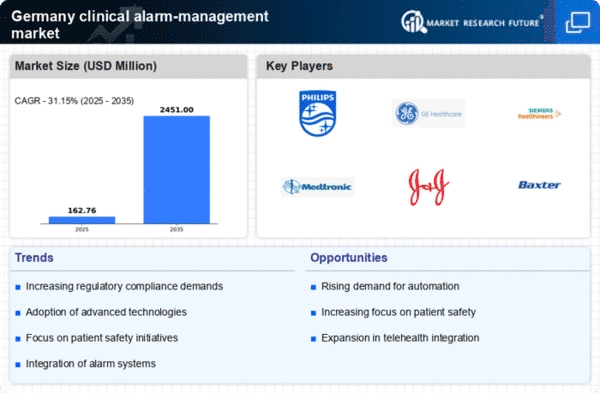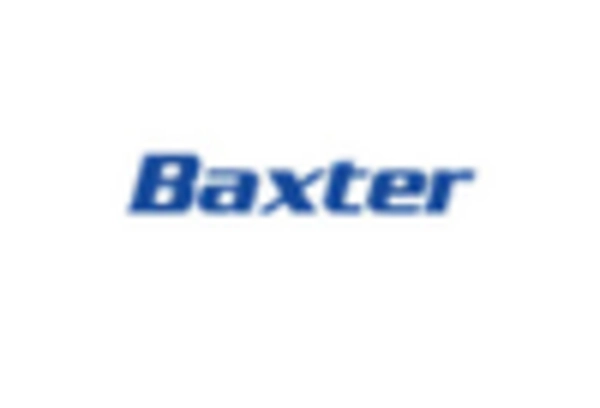Growing Awareness of Alarm Fatigue
Awareness of alarm fatigue among healthcare professionals is increasingly impacting the clinical alarm-management market in Germany. Alarm fatigue occurs when clinicians become desensitized to frequent alarms, leading to delayed responses to critical alerts. This phenomenon has prompted healthcare organizations to reevaluate their alarm systems and implement more effective management strategies. Educational initiatives aimed at training staff on the importance of alarm management are gaining traction. As awareness grows, hospitals are likely to invest in systems that prioritize clinically relevant alarms, thereby enhancing patient safety. The clinical alarm-management market is expected to benefit from this shift towards more strategic alarm utilization.
Rising Demand for Patient Safety Solutions
The clinical alarm-management market in Germany is experiencing a notable surge in demand. This is driven by an increasing focus on patient safety. Healthcare providers are prioritizing the reduction of alarm fatigue, which has been linked to adverse patient outcomes. According to recent data, alarm-related incidents contribute to approximately 30% of sentinel events in hospitals. This alarming statistic underscores the necessity for effective alarm management systems. As hospitals strive to enhance patient care, investments in advanced alarm technologies are becoming essential. The clinical alarm-management market is projected to grow as healthcare facilities adopt solutions that minimize false alarms and improve response times, ultimately fostering a safer environment for patients.
Shift Towards Integrated Healthcare Solutions
The clinical alarm-management market in Germany is witnessing a shift towards integrated healthcare solutions that encompass alarm management as part of broader patient care systems. This trend is driven by the need for seamless communication between various healthcare technologies, allowing for a more holistic approach to patient monitoring. Integration facilitates the sharing of alarm data across platforms, improving response times and coordination among healthcare teams. As hospitals seek to enhance operational efficiency, the demand for integrated alarm management solutions is likely to rise. This evolution in the clinical alarm-management market suggests a future where alarm systems are not standalone but rather integral components of comprehensive healthcare delivery.
Increased Regulatory Focus on Alarm Management
The clinical alarm-management market in Germany is influenced by heightened regulatory scrutiny regarding alarm systems in healthcare settings. Regulatory bodies are emphasizing the need for standardized alarm management protocols to ensure patient safety. Compliance with these regulations is becoming a critical factor for healthcare institutions, as failure to adhere can result in significant penalties. The German government has introduced guidelines that mandate the implementation of effective alarm management strategies, which is expected to drive market growth. As healthcare facilities invest in compliant alarm systems, the clinical alarm-management market is likely to see an influx of innovative solutions designed to meet these regulatory requirements.
Technological Advancements in Monitoring Systems
Technological innovations are significantly shaping the clinical alarm-management market in Germany. The integration of sophisticated monitoring systems, such as wearable devices and remote patient monitoring, is enhancing the ability to manage alarms effectively. These advancements allow for real-time data analysis, enabling healthcare professionals to respond promptly to critical situations. The market is projected to witness a compound annual growth rate (CAGR) of around 12% over the next five years, driven by the adoption of these technologies. As hospitals increasingly implement smart alarm systems that utilize artificial intelligence and machine learning, the clinical alarm-management market is likely to expand, providing more efficient and reliable solutions for patient monitoring.
















